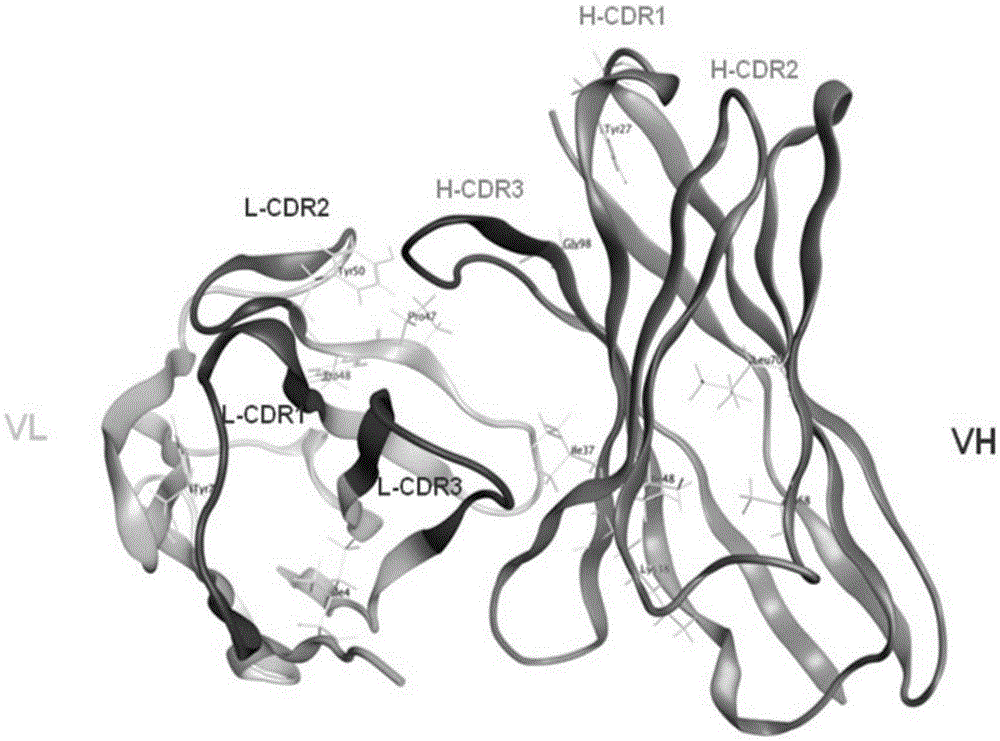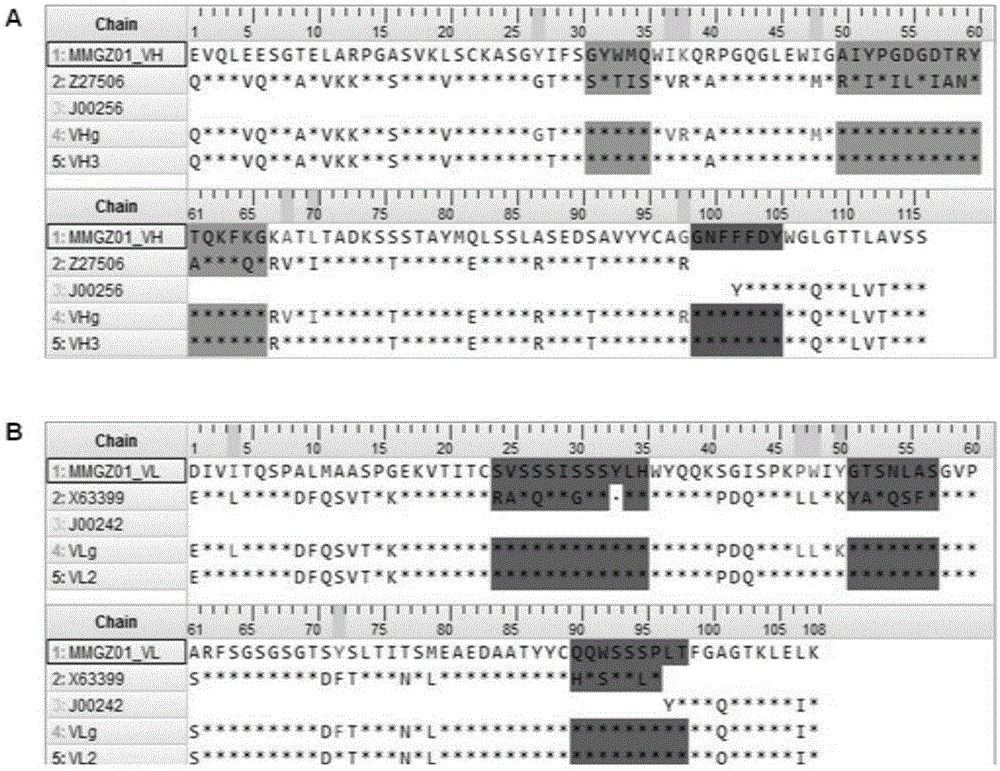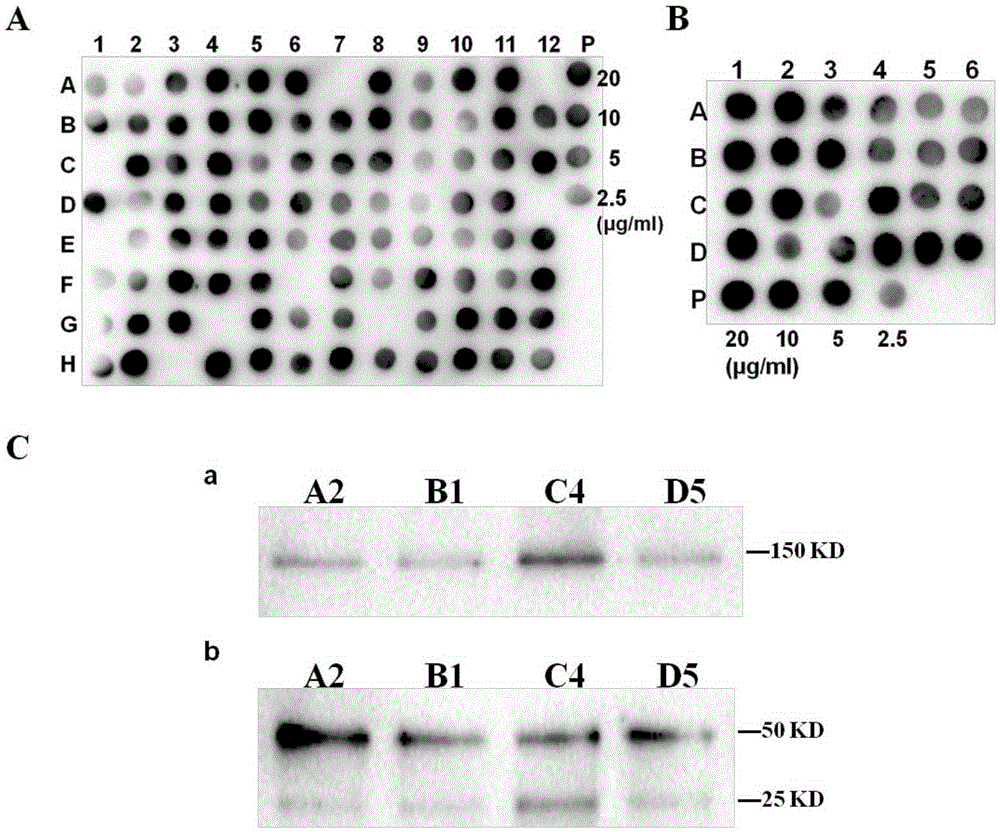Anti-human Delta-like4 humanized antibody and preparation and application thereof
A technology of humanized antibodies and antibody fragments, applied in the field of bioengineering, can solve the problem of low affinity and specificity of mouse antibodies
- Summary
- Abstract
- Description
- Claims
- Application Information
AI Technical Summary
Problems solved by technology
Method used
Image
Examples
Embodiment 1
[0033] Application of bioinformatics software to simulate the three-dimensional structure of mouse monoclonal antibody Fv region ( figure 1 ), and analyze the classic amino acids necessary to maintain the conformation of the CDR region according to its three-dimensional structure, search the human Fabsequence database according to the classic amino acids in the FR region, and find the most suitable human FR template, such as figure 2 As shown, Z27506 and J00256 are the human FR templates of the heavy chain variable region, and X63399 and J00242 are the human FR templates of the light chain variable region. Replace the FR region of the mouse monoclonal antibody with a human template to obtain a CDR-grafted antibody (VH g / VL g ), on this basis, the important classic amino acids in the FR region were selected for back mutation, and the heavy and light chain variable regions of the humanized antibody H3L2 (expressed as VH 3 , VL 2 ).
[0034] The resulting humanized heavy c...
Embodiment 2
[0037] Electroporation and co-transfection of CHO-S cells were carried out with the above-mentioned four successfully constructed vector plasmids, and the electroporation transfection conditions were: 160V, 15ms. After 24 hours, add G418 for selection (final concentration is 700-1000 μg / ml), change the medium every 2-3 days, and clones grow after about 10 days, pick clones and culture them in 96-well plates, and take the supernatant after the cells are full. For DotBlot, the working antibody is HRP-labeled goat anti-human IgG (H+L). According to the DotBlot results, select positive clones and expand them into 24-well plates for culture, then take the supernatant for DotBlot; select positive clones and expand them into T-25 culture flasks for culture, take the supernatant for WesternBlot, select cell lines with correct expression and assembly, freeze them and store them. The second round of screening was carried out, and the screening steps were the same as above. After two ro...
Embodiment 3
[0040] The cell culture supernatant was suction-filtered with a 0.22 μm filter membrane, and then loaded into the Protein A chromatography column through a peristaltic pump. After loading the sample, the column was washed with Bindingbuffer until the UV signal line became straight. The sample was then eluted with 0.1 M pH 3.0 sodium acetate buffer (Elutionbuffer) for 5 column volumes. In order to neutralize the acidic substances in the Elutionbuffer, add 1MpH9.0Tris to the sample receiving tube at 100μl / ml eluent; the eluted sample is analyzed for SDS-PAGE purity and replaced by ultrafiltration, and the Bio-Tek protein microquantifier is used to analyze the Antibody concentration was measured.
[0041] see results Figure 4 .
[0042] Example 4 SPR determination of antigen-antibody affinity.
PUM
 Login to View More
Login to View More Abstract
Description
Claims
Application Information
 Login to View More
Login to View More - R&D
- Intellectual Property
- Life Sciences
- Materials
- Tech Scout
- Unparalleled Data Quality
- Higher Quality Content
- 60% Fewer Hallucinations
Browse by: Latest US Patents, China's latest patents, Technical Efficacy Thesaurus, Application Domain, Technology Topic, Popular Technical Reports.
© 2025 PatSnap. All rights reserved.Legal|Privacy policy|Modern Slavery Act Transparency Statement|Sitemap|About US| Contact US: help@patsnap.com



